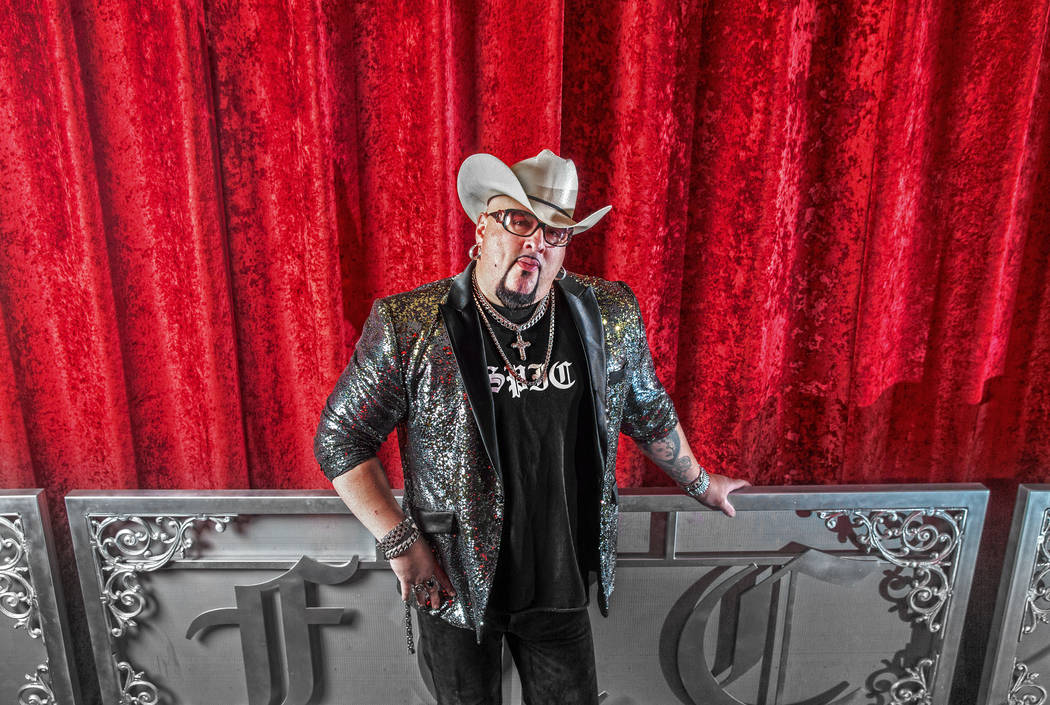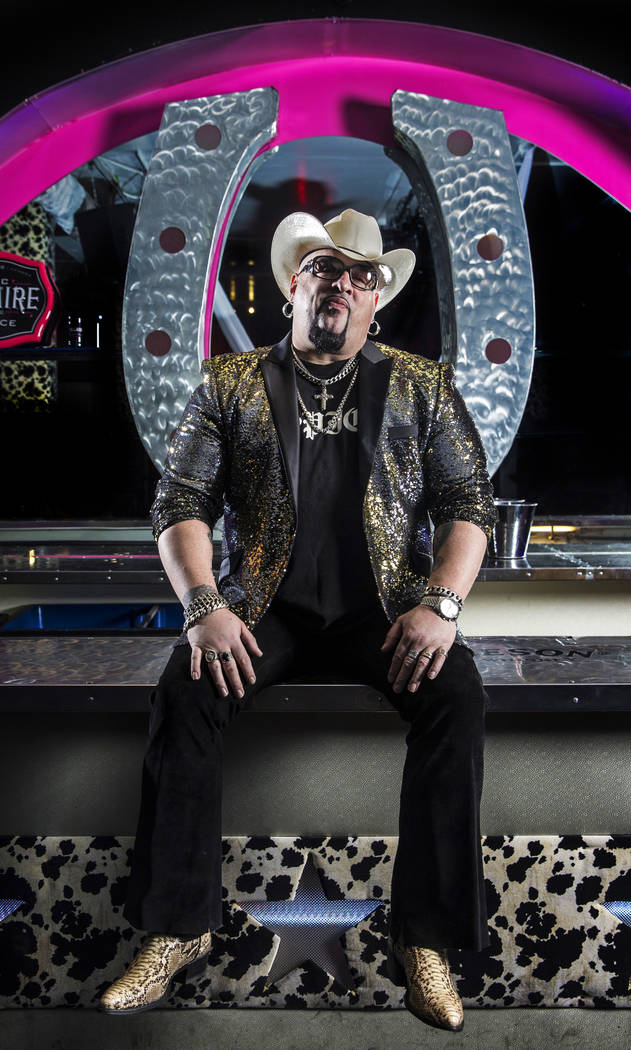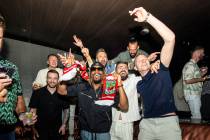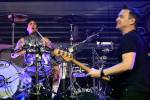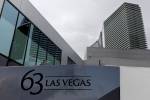Nightlife impresario looms large in downtown Las Vegas music scene
Vegas Voices is a weekly series highlighting notable Las Vegans.
The shiny silver acoustic guitar positioned behind the bar matches the glimmering, custom-made sport coat of the Volvo-sized man currently standing atop it.
“Big Daddy” Carlos Adley’s joints creak a bit as he jumps down from his perch, his picture having just been snapped during a photo session.
“Twenty years of football,” he says by way of an explanatory exhale.
Close your eyes and imagine what a former pro football prospect turned Hollywood and Las Vegas nightclub impresario might look like, and there’s a good chance that some approximation of Adley’s likeness looms into the mind’s eye: As big and flashy as a chrome-plated boulder, he’s a commanding, albeit friendly presence, omnipresent cowboy hat and Chanel shades contrasted with snakeskin boots and a neck swathed in gleaming chains.
The music venue in which he stands mirrors Adley’s rustic-luxe look: Massive, illuminated horseshoes pulsate beneath deer antler chandeliers; ample cattle-print fabrics brighten the room alongside red and white leather VIP couches, a plush velvet curtain hangs in front of the stage.
“I coined it ‘Tex-Mex swanky chic,’ subtitled: ‘Sinatra on LSD.’ ” Adley says of the Fremont Country Club’s decor, which he designed with his wife and fellow nightlife entrepreneur, Ava Berman.
Next door is Backstage Bar & Billiards, the smaller of the two sister venues, both housed in the old Sears building downtown.
Five years ago, Adley opened them in the then-indie-rock-centric Fremont Arts District.
Since then, the two venues have hosted hundreds of local and national acts, helping cement the area as one of Vegas’ most vibrant music destinations.
A musical multi-hyphenate, Adley’s a venue-owner-restaurateur-promoter-musician-philanthropist who’s been immersed in nightlife since he was a teenager working for the singer of Van Halen in his native L.A.
“I firmly believe that, short of curing cancer and going to the moon, you can do anything you want,” he says. “And I’m a living example of that.”
Taking a break from running his club and saving the whales via his Ocean Aid nonprofit, the nightlife lifer reflects on his career as Fremont Country Club and Backstage Bar & Billiards turn 5:
Review-Journal: So, how exactly does one go from being an NFL prospect to a nightclub impresario?
Adley: One of my first jobs was bouncing for David Lee Roth when I was 15, 16 years old (at Roth’s after-hours club The Zero). I grew up in Hollywood, hanging out at punk rock shows, and eventually started bouncing. I met David at a club called the Cathay de Grande. I just kind of worked my way in. I had a fake ID. The first night I worked for him, Madonna came up and had like 15 people with her. I was like, ‘You ain’t gettin’ in. I don’t care who you are. Beat it.’ (Roth) saw me, he was like, ‘Buddy, you’ll always have a job with me.’
By the time I was 18, 19, I was like the door god, because you have to understand, The Zero was the club. This was the club that everyone went to when everything else closed. It was the Studio 54 of Hollywood, if you will, but a lot smaller and more intimate. On any given night, you’d be partying with Miss September and Tiny Tim, just whoever. It was so eclectic, so amazing. I saw David, he was arguably the biggest rock star in the world, and he’s throwing parties, walking out with like 20, 30 grand in cash a night. I was like, ‘That’s what I’m going to do.’ And within a couple years, I said, ‘I know everybody here. Everybody knows me. I’m just going to start doing my own clubs.’ By the time I was 20, 21, I was running a couple of the biggest clubs in Hollywood.
When you opened this place five years ago, the culture of downtown was different, dominated by the indie rock scene. What was the allure?
I just saw a void that is so imperative when you’re trying to create any kind of cultural and musical renaissance. I felt the need to do what we do, which is bring live entertainment, to the greatest part of Las Vegas, which is downtown. What downtown represents is timeless.
Musically speaking, what did you want to bring here that you felt was missing?
The versatility that would allow world-class national acts to come downtown that have never come downtown before. What had already been created was something for the indie scene, something for the locals. What we wanted to do was enhance that, but at the same time, every genre of music that we would bring forth, we made a point to bring iconic acts. So if we’re going to have ska one night, we’re going to have Fishbone. If we’re going to have rockabilly, we’re going to have Wanda Jackson. If we’re going to have industrial, we’re going to have Ministry. That was the whole concept.
Did you scout a lot of locales in the area? How did you come up with this spot.
The story starts when I was going to do this concept at the Tropicana with Vince Vaughn and a few of my other Hollywood friends. Then that corporation at the time went Chapter 11, things went south and we decided, ‘Well, if it wasn’t at the Tropicana, which is as old school as it gets on the Strip, we’re going to take it downtown.’ We looked at several locations, and the first was Binion’s — we partnered up with (Binion’s and Four Queens owner) Terry Caudill. In the interim, Mayor Goodman and (business development director for the city of Las Vegas) Scott Adams got ahold of me and said, ‘Listen, you might want to throw your hat in for this because we have the old Sears building.’
The beauty with this location is that we knew that we could do two venues under the same umbrella. I always dreamed, ‘What if CBGB’s and Max’s Kansas City were right next to each other, and on any given night, you could see one genre of music and then another genre by just be-bopping right next door?’ That’s what we were so excited about.
What was the genesis of your nonprofit Ocean Aid?
I spent a lot of time as a child on the North Shore of Hawaii. When I went back in recent years, I saw what was happening to Hawaii and the Pacific Rim: You have five gyres, which are basically plastic islands of pollution, the largest one is twice the size of Texas, that sit in the Pacific Rim, so any time there’s a storm or anything like that, it acts like a cheese grater and all that debris just kills their shores. Within the next five years, if nothing’s done, the fishing population will be decimated and by 2050, there will be more plastic pollution in the ocean than actual fish. So we decided through the connectivity of music to bring people together for this cause (with an annual benefit music fest in Hawaii). We’re saving turtles, we’re saving the whales, we’re saving the endangered species and, in turn, ensuring our future for generations to come.
Getting to know: “Big Daddy” Carlos Adley
Pets
I have two Chihuahuas. I have a 27-year old son who is gone now, so our babies, our kids, are two little chihuahuas: Lupe and Margarita.
Favorite movie
I’ll give you a top three, in no particular order, and this is a revolving door: ‘Casino,’ because I love the history of Las Vegas and Scorsese does documentaries, basically; ‘One Flew Over the Cuckoos Nest;’ and back to Scorsese with ‘Goodfellas.’ And ‘Godfather II’ would be up there. And ‘Scarface.’ I love gangster movies because I grew up in the subcultures of big cities and that kind of went hand in hand. I saw a lot of it. I was never immersed in that lifestyle, because I never had to be, but a lot of my friends were gangsters.
Favorite indulgence
The spirituality of music — I don’t know if I consider it an indulgence as much as a necessity, because I couldn’t live without it.
Hobbies
My vocation is my avocation.
Food could you eat every day
My food from my restaurant, (L.A.’s) Velvet Margarita, which is all based on my grandmother’s cooking, right here (reveals tattoo of her on his forearm). The menu at my restaurant is all my favorite dishes growing up, from not only my grandma, but my aunts and uncles and so forth. That’s why I could never get tired of eating it, because it’s what I grew up on.
Contact Jason Bracelin at jbracelin@reviewjournal.com or 702-383-0476. Follow @JasonBracelin on Twitter.



